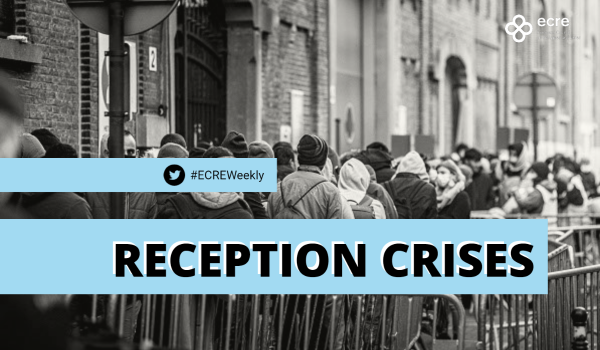Following a legal victory for ECRE member the Dutch Council for Refugees (DCR), the Dutch government has appealed a ruling ordering respect for the right to reception. In Belgium, people are denied access to apply for asylum and reception with authorities leaving 21 minors to sleep rough in the streets.
DCR recorded a legal victory in a case filed in August against the Dutch government and the Central Agency for the Reception of Asylum Seekers (COA) over the ongoing reception crisis in the Netherlands. According to a statement from the organisation in response to the ruling the case was filed because 18,000 asylum seekers were exposed to harmful conditions and reception conditions had fallen below minimum standards for a year and could not be considered temporary. On 6 October, a Dutch court ordered the government “to bring conditions in Dutch emergency asylum centres up to European Union standards”. The court ruled that asylum seekers must not stay in the streets of Ter Apel and instead must be accommodated in locations that meet the minimum requirements. The court also said that vulnerable asylum seekers must not stay in emergency shelters and must have access to clean drinking water and food. DCR described the ruling as “crystal clear and necessary” and added that it: “is not yet a reason for joy. It is sad that something as basic as humane care requires a court ruling, and we are only happy when no asylum seeker has to sleep in a tent, gym or event hall anymore” (translated). Furthermore, DCR urged the Dutch state secretary to come up with a plan as soon as possible to ensure humane reception conditions, and also expressed their readiness to help wherever it is possible. The government has decided to appeal the ruling. DCR responded: “We would rather see the government spend its time meeting the deadlines to improve the reception of the vulnerable, rather than fighting this ruling”.
Belgium has been failing to meet its obligation to provide reception to applicants for international protection since October 2021. Since then, the Belgian government has put a system of priorities in place to manage reception. Local media reported on 7 October of a “new low point” in Belgium’s reception crisis with vulnerable groups not provided accommodation. ECRE member Vluchtelingenwerk Vlaanderen described this as a worrying development: “In January, the transiting asylum seekers weren’t not given reception. The single men followed. There was talk of couples being refused a while ago, but that was quickly reversed. Now it concerns all single men, regardless of medical problems” and added: “Someone has been put on the street with jaundice, and someone with a serious form of cancer who needs treatment. This is “another step towards absolute chaos and inhumanity”, says Thomas Willekens from Vluchtelingenwerk Vlaanderen. By early October, 4,500 cases have been filed against the Belgian Federal Asylum Agency (Fedasil) before the Brussels labor court in 2022 for failing to provide shelter to asylum seekers. The court expects the number to reach 5000 within a week.
A change in the asylum procedure has been made to the registration of the applications for international protection. Registration has been temporarily moved to the buildings of the Immigration Office on Boulevard Pacheco in Brussels, and the Immigration Office is currently responsible for directing people who are entitled to reception to Fedasil located in Petit-Château. At the moment, the Immigration Office reportedly lets in 200 to 230 people a day and asylum seekers unable to register should receive an invitation within a legal limit of three days. However, according to ECRE member, Vluchtelingenwerk, people have been put on the street without an invitation. On 10 October, Thomas Willekens from Vluchtelingenwerk reported: “No man was able to apply for asylum this morning. 20 may come back this afternoon. 52 tomorrow, and 64 the day after tomorrow. Since those time slots of the coming days are already filled, ‘new’ men will probably not be able to apply for asylum at all in the coming days this week”. On 11 October, another alarming development in Belgium’s reception crisis occurred. Fedasil decided to close the doors of the main reception centre the Petit-Château to asylum seekers who registered earlier at the Immigration Office Pacheco to “ensure safety”. As seen by ECRE, Fedasil communicated that: “There were 39 minors, 89 people with families and 125 single men in Pacheco”. ECRE member Vluchtelingenwerk said in a statement on 12 October that the system of priorities is not respected, adding that “21 minors had to spend last night on the street in temperatures that were around freezing.” Director of Vluchtelingenwerk Vlaanderen said: “The protection system for minors shows worrying capacity shortages, which also means that they end up on the streets. This is extremely alarming. You can only solve this by providing more care”. On the same day, reportedly, 20 minors have registered their asylum claims and been given accommodation. However, “No solution has (yet) been found for the 21 minors who were not given shelter yesterday.” After leaving minors without accommodation, on 13 October, Fedasil put 125 people including families on the streets. ECRE member Vluchtelingenwerk Vlaanderen and other NGOs had to step in and “provide services that the Belgian state should provide.” These services include finding a temporary emergency shelter in hotels. In a statement by the organization: “This is only a temporary solution. We cannot commit ourselves to a long-term story as we are not a reception organization.
For further information:
- ECRE, Reception Crises: Hundreds of Asylum Seekers Left Without Accommodation in Ireland, Dutch Authorities Restrict Access to Ter Apel, NGOs Says Belgium Lacks Political Will for Shelter, September 2022
- ECRE, Reception Crises: Dutch State Sued Over Inhumane Conditions and Critisised over Proposed Crisis Measure to Limit Family Reunification, Fedasil staff Protests as Reception Crisis in Belgium Reaches Boiling Point, September 2022
This article appeared in the ECRE Weekly Bulletin. You can subscribe to the Weekly Bulletin here.

